Plant-based meat substitutes

US adults’ meat-eating habits
Nearly 3 in 10 US adults limit meat consumption
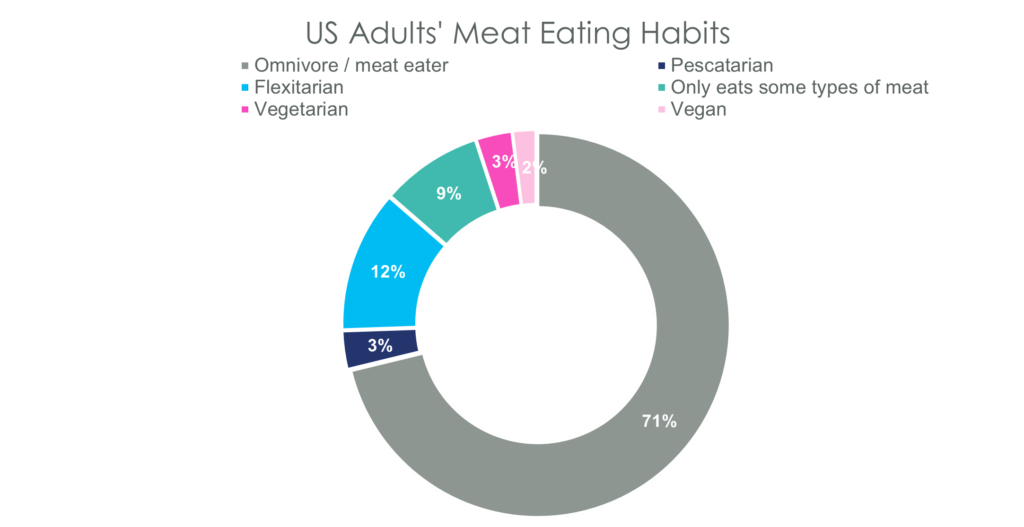
Although the majority (71%) of US adults describe their dietary habits as omnivorous, a significant minority avoid some or all types of meat. Over one in ten (12%) are flexitarian, avoiding meat most of the time. An additional 9% only eat some types of meat. However, only 8% avoid meat altogether: 3% say they’re vegetarian, 3% are pescatarian, and 2% are vegan.
The percentage of adults avoiding meat most or all the time is highest for young adults, which suggests that these dietary habits might be gaining popularity. A quarter (24%) of Gen Z identifies as flexitarian, pescatarian, vegetarian, or vegan, along with 23% of Millennials. In comparison, 18% of Gen X and Boomers identified in these same categories. Pescetarianism is especially popular amongst Gen Z—8% report eating fish but not red meat or poultry.
Most non-meat eaters (vegans, vegetarians, and pescatarians) did eat meat at some point in their life. A fifth (21%) have avoided meat their whole lives.
Motivations for eating & avoiding meat
A quarter (24%) of meat-eating Americans eat less meat than they would otherwise out of concern for their health. A fifth (21%) also report that their meat consumption is lowered due to the impact on animals. Meat-eating women are more likely than meat-eating men to eat less meat out of concern for animals. A quarter of women (25%) eat less meat because of the impact on animals, compared to 17% of men. Only 15% of meat eaters eat less meat than they would otherwise because of environmental concerns.
On the other hand, half (47%) of US meat eaters report consuming more meat simply out of an enjoyment of it, and a quarter (26%) of meat eaters say they eat more meat out of a desire to consume traditional cultural or family recipes. Interestingly, Gen Z is more likely to eat more meat because of these traditional reasons (45%). Additionally, a third (35%) of Gen Z meat-eaters eat more meat because of heath or nutrition concerns, whereas a third (33%) of meat-eating Boomers eat less meat for the same reason.
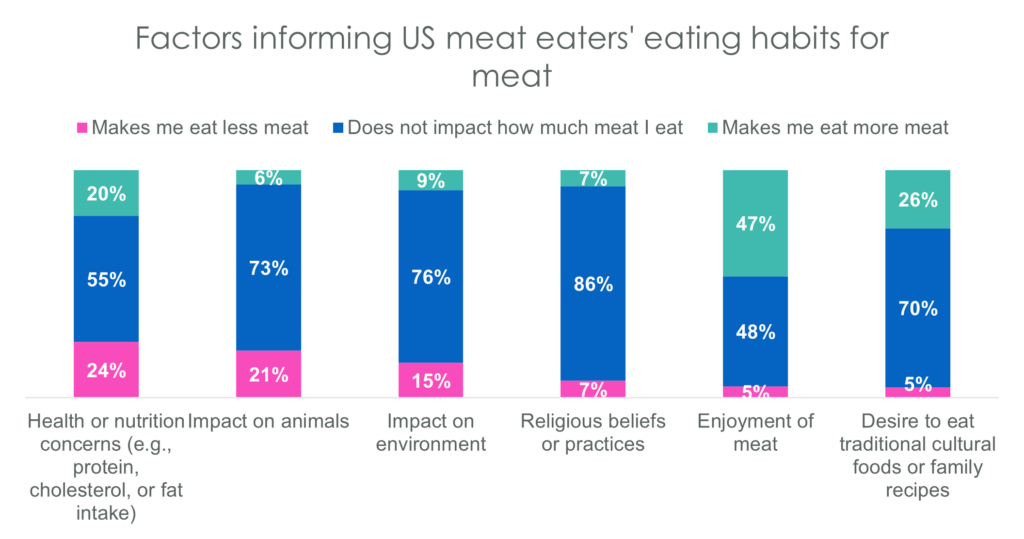
For those who don’t eat meat, health concerns are the top reason for avoiding it. Over eight in ten (85%) non-meat eaters avoid meat at least in part due to this. In addition, over three quarters (78%) of non-meat eaters cite the impact on animals as a reason for avoiding meat, and three quarters (75%) avoid meat for environmental reasons.
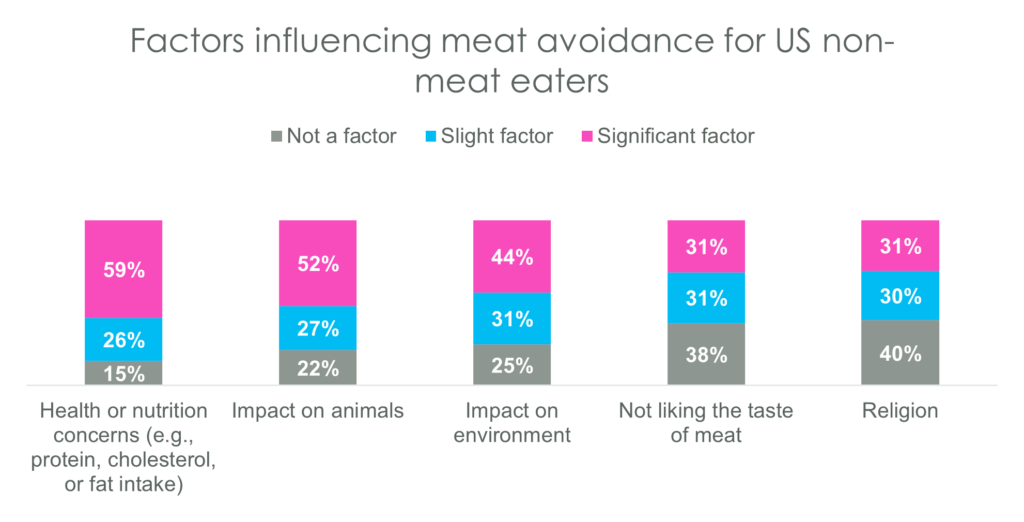
Poultry most popular amongst US meat eaters
Amongst US adults who do eat meat, poultry is consumed most often. Over three quarters (78%) of meat-eating adults eat poultry at least once a week. In addition, seven in ten (69%) eat red meat at least weekly. Men eat red meat more frequently than women: three quarters of meat-eating men (74%) report eating red meat at least once a week, whereas just over six in ten women (64%) eat it that often.
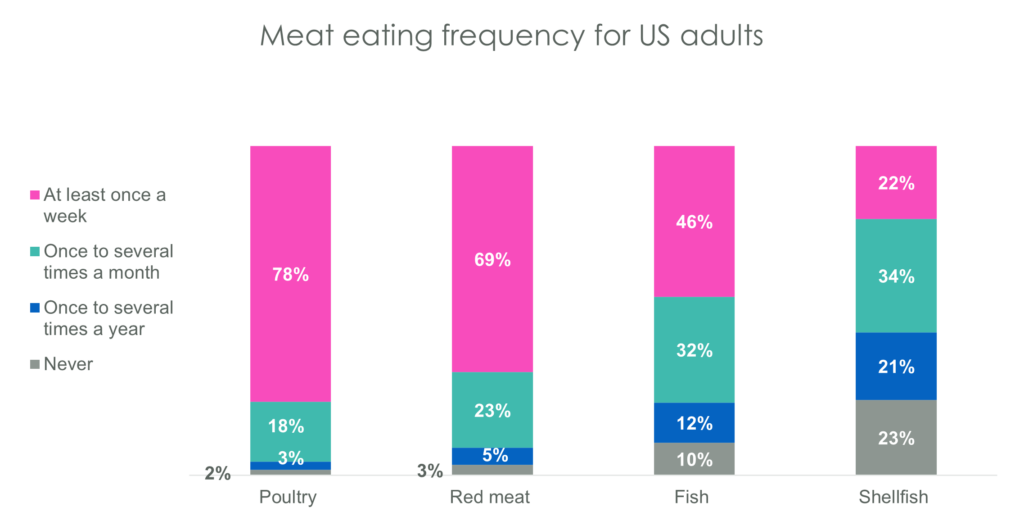
Both meat-eaters and pescatarians eat fish much more frequently than shellfish. Nearly half (46%) of meat-eaters have fish at least once a week, along with over half of pescatarians (55%). In contrast, only a fifth of meat-eaters eat shellfish weekly (22%), and nearly the same amount (23%) never eat it at all. Thirty five percent of pescatarians eat shellfish at least once a week.
Plant-based meat consumption & preferences
Six in ten US adults have tried plant-based meat
About six in ten adults (60%) have tried at least one kind of plant-based meat substitute in the last year. Plant-based burgers are most popular—37% of US adults have had them at least once in the past year. A third (33%) of US adults have eaten plant-based ground meat in the past year.
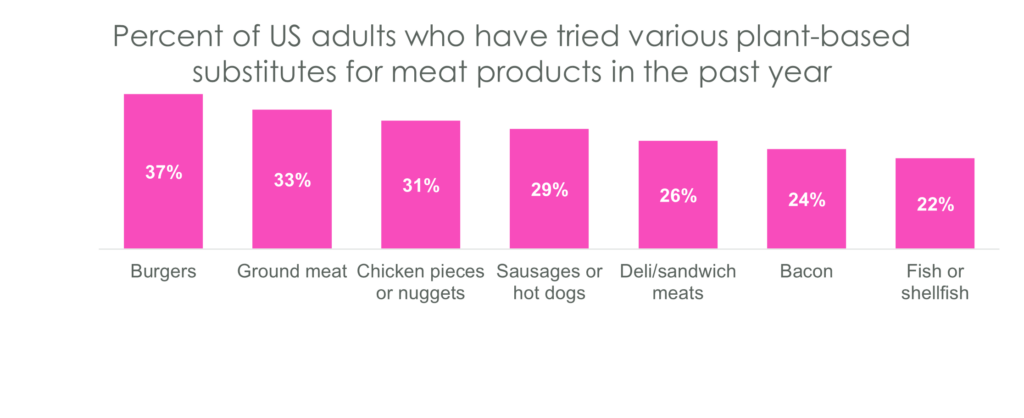
Not surprisingly, non-meat eaters are the most likely to eat plant-based meat substitutes on a weekly basis.
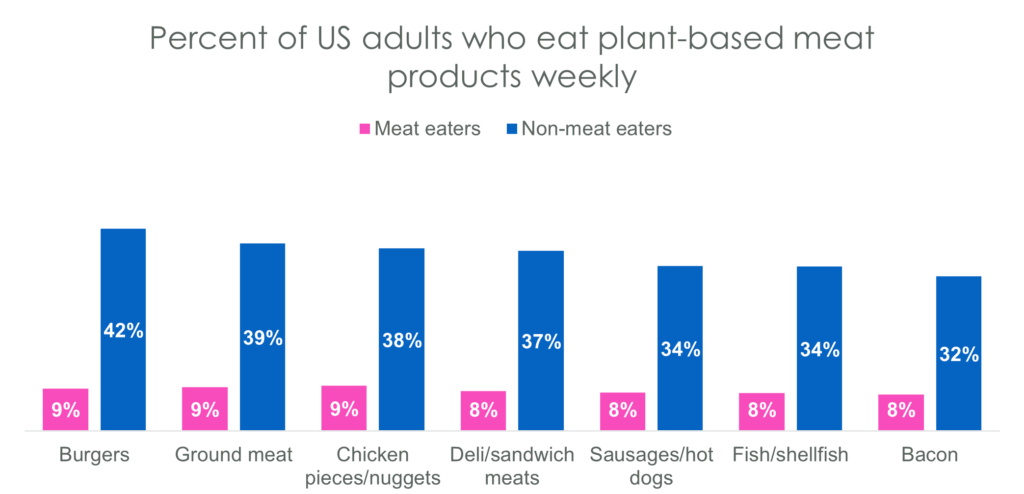
Although meat eaters consume plant-based meat substitutes less frequently than non-meat eaters, a substantial portion of meat eaters also eat plant-based meat substitutes periodically. About one in five meat eating adults eat plant-based burgers (19%), ground meat (19%), and/or chicken (18%) at least once a month, suggesting that the market for these products is not entirely made up of those who don’t eat meat products.
Good flavor, healthiness most important to US adults when choosing plant-based meat
Plant-based meat eaters are most interested in whether their plant-based meat substitutes have a flavor they like (82%) and are healthy (78%). American plant-based meat eaters are also interested in products with high protein contents (75%) and similar flavor (73%) and texture (72%) to real meat.
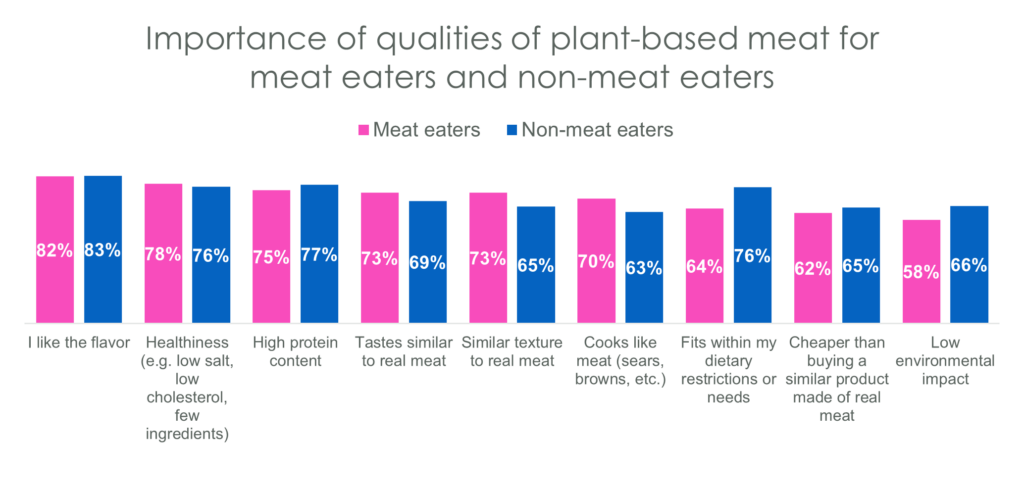
Meat eaters and non-meat eaters alike care about flavor, healthiness, and protein content at similar rates as non-meat eaters. Meat eaters are more likely than non-meat eaters to care about plant-based meat behaving similarly to real meat, although this is a priority for a majority of consumers in both categories.
Two-fifths of US adults have not tried plant based meat
Not all non-meat eaters are interested in plant-based meat substitutes, even for more popular plant-based products like burgers (11%), ground meat (15%), and chicken (14%). Given that many non-meat eaters cited not enjoying the taste of meat as one of their reasons for not eating meat, it makes sense that a portion of those consumers might not be interested in trying products that aim to imitate the experience of eating meat. However, very few non-meat eaters reported having never tried any plant-based meat substitutes at all.
For meat eaters, disinterest in plant-based meat products is higher. Four in ten meat eaters (43%) reported never having tried a plant-based meat substitute. For those who hadn’t tried any of these products, over half (59%) said that they hadn’t because they were happy eating the meat versions of these products. At least a third of Americans report never having tried, and having no interest in trying, plant-based burgers (33%), ground meat (37%), and chicken (39%).
Older adults were more likely to have not tried any plant-based meat products when compared to younger adults. Interestingly, however, young people were more likely to report that they had never heard of plant-based meat before the survey. One in five (20%) GenZers who hasn’t tried plant-based meat said they had never heard of plant-based meat, compared to 11% of Millennials, 7% of Gen X, and 3% of Boomers who haven’t tried it. This suggests that older adults’ lower interest in these products is not due to lack of exposure to their existence.
Across the board, people who haven’t tried plant-based meat substitutes expressed disinterest or indifference towards any specific aspects of a new product.
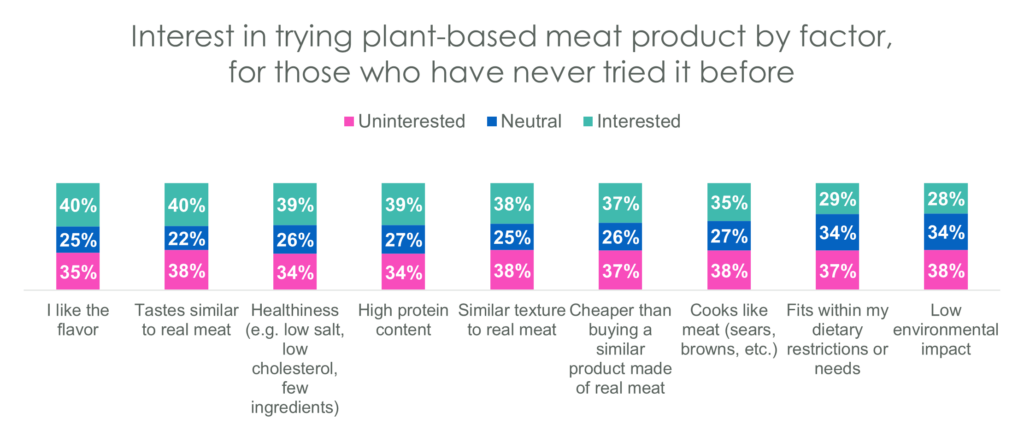
Members of Gen Z who have never eaten these foods expressed more openness to trying plant-based meat products when compared to older adults. Half of Gen Z who’s never tried plant based meat said they’d have interest in a plant-based product if it tasted similar to real meat (54%) and/or if the product was cheaper than real meat (54%). Because younger consumers are more open to trying these new products, plant-based meat companies may have an opportunity to expand their customer base to younger audiences who have yet to try their products.
Written by Naomi Horn, Research Analyst for Opinium US.




